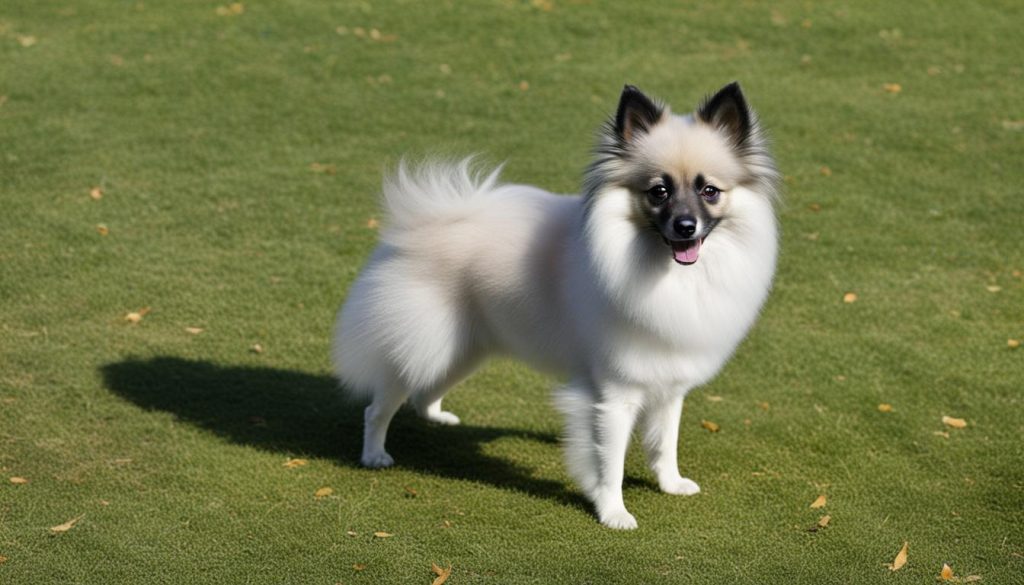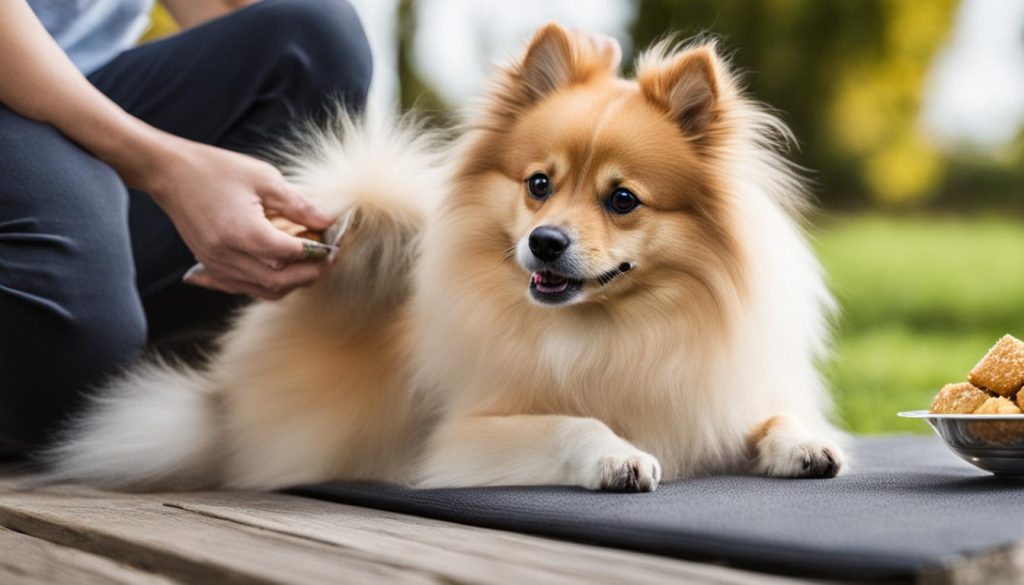Are you struggling with training your German Spitz? Don’t worry, I’m here to help! German Spitz dogs are known for their intelligence and trainability, but they can also be a bit stubborn. With the right techniques, you can have your German Spitz obedient and well-behaved in no time.
Attending obedience school from a young age is highly recommended for German Spitz training. It’s essential to start early and establish good habits to prevent any behavioral issues from developing. One highly recommended trainer is Chris Geary from Baybark. He has a wealth of experience in working with German Spitz and can provide the expert guidance needed to train your furry friend.
While German Spitz dogs don’t require extensive exercise, daily walks are beneficial for their overall well-being. It’s also a great idea to take them to off-leash dog parks where they can socialize with other dogs and expend their energy in a safe environment. German Spitz dogs can also excel in various dog sports like Endurance, Agility, and Flyball.
However, it’s crucial to note that German Spitz puppies under 18 months should not be overexercised. Their growing bodies need time to develop properly, so it’s important to provide them with appropriate exercise levels for their age.
So, if you want to master German Spitz training and have a well-behaved companion, follow the tips and techniques outlined in this article. With a little patience, consistency, and positive reinforcement, your German Spitz will become the obedient and well-trained dog you’ve always wanted.
German Spitz Training
- Attending obedience school from a young age is recommended for German Spitz training.
- Chris Geary (Baybark) is a highly recommended trainer for German Spitz.
- Daily walks and off-leash dog park visits are beneficial for German Spitz.
- German Spitz dogs can excel in dog sports like Endurance, Agility, and Flyball.
- Avoid overexercising German Spitz puppies under 18 months.
History of the German Spitz
The German Spitz is a remarkable dog breed with a rich and ancient history that can be traced back to Central Europe. This breed has captivated dog lovers for centuries with its distinctive traits and unique charm. Let’s explore the fascinating origins and captivating history of the German Spitz.
The German Spitz Breed
The German Spitz is a diverse breed that comes in various sizes, including the Pomeranian/Toy Spitz and the Keeshond/Wolfspitz. Despite their differences in size, these breeds are closely related and share common ancestry.
Ancient Origins
The history of the German Spitz dates back to the Middle Ages, making it one of the oldest dog breeds in existence. Originally, German Spitz dogs were bred for hunting and guarding purposes, showcasing their innate intelligence and alertness.
Popularity in England
During the 18th and 19th centuries, German Spitz dogs gained significant popularity in England, particularly among the royalty and upper class. They became beloved companions and were often found in the company of esteemed individuals, including Queen Victoria, who had a fondness for German Spitz dogs.
Today, the German Spitz continues to be adored by dog enthusiasts worldwide for their enduring beauty, lively temperament, and charming personality. Their history and unique qualities make them a treasured breed among dog lovers.
German Spitz Physical Characteristics
When it comes to appearance, German Spitz dogs have a distinctive charm. With their fox-like face, pointy ears, and a bushy tail, they truly stand out. But it’s not just their facial features that make them unique; their coat also plays a significant role.

The German Spitz boasts a double coat that is soft and dense, consisting of a longer outer fur. This beautiful coat can come in various colors, including white, black, brown, and orange. These vibrant hues enhance their allure and make them even more eye-catching.
In addition to their gorgeous appearance, German Spitz dogs come in a small size, which is perfect for those seeking a compact companion. They typically stand between 12-15 inches and weigh between 7-30 pounds. This size makes them suitable for various living environments, whether it’s a cozy apartment or a spacious house with a backyard.
German Spitz Temperament and Personality
German Spitz dogs are known for their lively and friendly personalities. They are alert, playful, and curious. These adorable furballs bring joy and companionship to their families, forming strong bonds with their human counterparts. German Spitz dogs are generally good with kids, making them excellent family pets.
However, it’s important to note that German Spitz dogs have a natural prey drive and may have a tendency to chase small animals due to their hunting instincts. As a responsible owner, it’s essential to provide a secure and controlled environment for your German Spitz to prevent any unwanted incidents.
In terms of intelligence, German Spitz dogs are highly intelligent and quick learners. They possess a sharp mind and are receptive to training. However, they can also exhibit a bit of independence and stubbornness at times, so patience and consistency are key when it comes to German Spitz training.
- Alert
- Playful
- Curious
- Loyal
German Spitz dogs are known for their loyalty to their families. They will go above and beyond to protect and be by your side. With their friendly nature and intelligence, German Spitz dogs are a joy to have around and can bring endless fun and happiness to your household.
Training Tips for German Spitz
When it comes to German Spitz training, positive reinforcement is key. These intelligent dogs respond well to praise, rewards, and treats. Keep the German Spitz training sessions fun and engaging to hold their interest. Here are some tips to help you train your German Spitz:
- Start early: Begin training your German Spitz puppy as soon as you bring them home. Early socialization and training will help them develop good habits and manners.
- Be consistent: Establish a routine and stick to it. Consistency is important for effective training. Set clear rules and boundaries from the beginning.
- Use positive reinforcement: Reward your German Spitz with praise, treats, and playtime when they exhibit desired behaviors. This will motivate them to repeat those behaviors.
- Focus on basic commands: Start with basic commands like “sit,” “stay,” and “come.” Once they master these, move on to more advanced commands.
- Train in short sessions: German Spitz dogs have short attention spans, so keep training sessions short and frequent. Aim for 5-10 minutes several times a day.
- Stay patient and calm: German Spitz dogs can be independent and stubborn, but patience and calmness will yield better results than frustration or punishment.
- Seek professional help: Consider enrolling your German Spitz in professional training classes. A certified trainer can provide guidance and expert advice.
Remember, every dog is unique, so tailor your German Spitz training approach to suit your German Spitz’s personality and learning style. With consistent practice and positive reinforcement, your German Spitz will become a well-behaved and obedient companion.

German Spitz Grooming and Care
Proper grooming is essential to keep your German Spitz healthy and looking their best. Let’s explore some important grooming and care tips for this adorable breed.
Grooming
German Spitz dogs have a profuse double coat that sheds twice a year. To minimize shedding and keep their coat in good condition, regular brushing is necessary. Daily brushing removes loose hair and prevents matting. It also stimulates the production of natural oils, which help keep their coat shiny and healthy.
Bathing
German Spitz dogs have a self-cleaning coat that doesn’t require frequent bathing. Bathing them once every two to three months is sufficient unless they get particularly dirty. Be sure to use a gentle dog shampoo that is specifically formulated for their coat type.
Exercise
Although German Spitz dogs do not have high exercise requirements, they still need regular physical activity to stay healthy and happy. Daily walks are essential to provide mental stimulation and keep them physically fit. Interactive playtime also helps prevent boredom and keeps them mentally engaged.
In addition to walks and play, consider engaging your German Spitz in activities such as puzzle toys, agility training, or obedience training. These activities provide both physical and mental exercise, helping to fulfill their curious nature and prevent behavioral issues.
Caring for Your German Spitz
- Provide a balanced and nutritious diet to support their overall health.
- Keep their teeth clean by regularly brushing them and providing dental treats or toys.
- Trim their nails regularly to avoid overgrowth and discomfort.
- Check their ears weekly for any signs of infection or irritation. Clean them gently with a cotton ball dampened with an ear cleaner recommended by your veterinarian.
- Schedule regular vet check-ups to monitor your German Spitz’s health and address any potential issues proactively.
By following these grooming and care tips, you can ensure that your German Spitz is happy, healthy, and always looking their best!
Conclusion
German Spitz dogs are an excellent choice for families looking for a highly trainable and affectionate pet. With their long history and unique physical characteristics, they bring a touch of elegance to any home.
Training German Spitz dogs from a young age using positive reinforcement is essential for their well-being and obedience. It is recommended to enroll them in obedience school or seek the guidance of a professional trainer to help them reach their full potential.
Regular grooming is necessary to keep their beautiful double coat healthy and reduce shedding. Daily brushing and occasional baths will keep them looking their best. Additionally, German Spitz dogs require regular exercise to keep them mentally and physically stimulated. Daily walks and playtime will keep them happy and prevent boredom.
By providing proper care, training, and attention, German Spitz dogs can thrive as loyal and well-behaved companions. Their intelligence, lively personality, and friendly nature make them a delightful addition to any family. If you’re considering adding a German Spitz to your household, you’ll be rewarded with a loving and devoted companion for many years to come.
FAQ
Are German Spitz dogs easy to train?
Yes, German Spitz dogs are intelligent and respond well to training, especially when using positive reinforcement methods.
Should I consider attending obedience school with my German Spitz?
Yes, attending obedience school from a young age is recommended to ensure proper training and socialization.
What trainer do you recommend for German Spitz training?
Chris Geary from Baybark is a recommended trainer for German Spitz training.
How much exercise does a German Spitz need?
German Spitz dogs do not require a lot of exercise but daily walks and playtime are recommended to keep them physically and mentally stimulated.
Can German Spitz dogs participate in dog sports?
Yes, German Spitz dogs can participate in dog sports such as Endurance, Agility, and Flyball.
Can German Spitz puppies be overexercised?
Yes, it is recommended to avoid overexercising German Spitz puppies under 18 months to prevent injury or developmental issues.
What is the history of German Spitz dogs?
German Spitz is one of the most ancient dog breeds originating from Central Europe. They have a long history dating back to the Middle Ages and were used for hunting and guarding.
What are the physical characteristics of German Spitz dogs?
German Spitz dogs have a fox-like face, pointy ears, and a bushy tail. They have a double coat that is soft and dense, and their size can vary from 12-15 inches and 7-30 pounds.
What is the temperament of German Spitz dogs?
German Spitz dogs are known for their lively and friendly personalities. They are alert, playful, and curious. They form strong bonds with their families and are generally good with kids.
How do I train a German Spitz?
It is recommended to train a German Spitz from a young age using positive reinforcement methods. Professional training can also be beneficial for best results.
How often do German Spitz dogs need grooming?
German Spitz dogs have a profuse double coat that sheds twice a year. Daily brushing is required to remove the old coat, but they do not need frequent bathing.
What is the conclusion about German Spitz dogs?
German Spitz dogs are highly trainable and make great family pets. They have a long history, unique physical characteristics, and require regular grooming and exercise to keep them happy and healthy.






